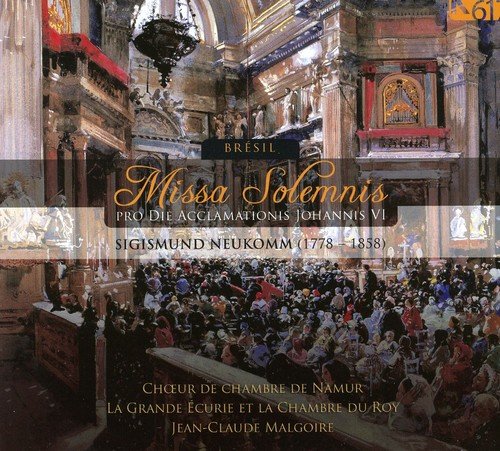NEUKOMM Mass. Requiem (Malgoire)
View record and artist detailsRecord and Artist Details
Composer or Director: Sigismund Neukomm
Genre:
Vocal
Label: Accent
Magazine Review Date: 09/2018
Media Format: CD or Download
Media Runtime: 131
Mastering:
DDD
Catalogue Number: ACC24344

Tracks:
| Composition | Artist Credit |
|---|---|
| Missa solemnis pro Die acclamationis Johannis VI |
Sigismund Neukomm, Composer
(La) Grande Ecurie et La Chambre du Roy Camille Poul, Soprano Daniel Auchincloss, Tenor Gemma Coma-Alabert, Mezzo soprano Jean-Claude Malgoire, Conductor Jonathan Gunthorpe, Bass Marie Camille Vaquié, Soprano Namur Chamber Choir Sigismund Neukomm, Composer |
| Requiem and Funeral March |
Sigismund Neukomm, Composer
(La) Grande Ecurie et La Chambre du Roy Cantaréunion Ensemble Vocal de l’Océan Indien Jean-Claude Malgoire, Conductor Sigismund Neukomm, Composer |
Author: David Vickers
Neukomm’s sombre Requiem (Paris, 1838) is set entirely for double choir (much of it male voices only) and accompanied by eight brass instruments (including ophicleide) and organ. The combined singers of Cantaréunion and Ensemble Vocal de l’Océan Indien are woolly around the edges, which makes proceedings uneven and disappointing. Nevertheless, the constituent Missa pro defunctis, Miserere and Funeral March (the latter played sublimely) demonstrate Neukomm’s fluency when working in an utterly different style from the Brazilian Missa solemnis. Both performances are live recordings made in 2008, originally released separately by K617. Their collective reissue is an admirable testament to the late Jean-Claude Malgoire’s inquisitive creativity with his pioneering period band La Grande Écurie et la Chambre du Roy. Listeners keen to explore further might want to investigate Malgoire’s live Versailles recording of Neukomm’s Requiem à la mémoire de Louis XVI (Alpha, 2017).
Discover the world's largest classical music catalogue with Presto Music.

Gramophone Digital Club
- Digital Edition
- Digital Archive
- Reviews Database
- Full website access
From £8.75 / month
Subscribe
Gramophone Full Club
- Print Edition
- Digital Edition
- Digital Archive
- Reviews Database
- Full website access
From £11.00 / month
Subscribe
If you are a library, university or other organisation that would be interested in an institutional subscription to Gramophone please click here for further information.




